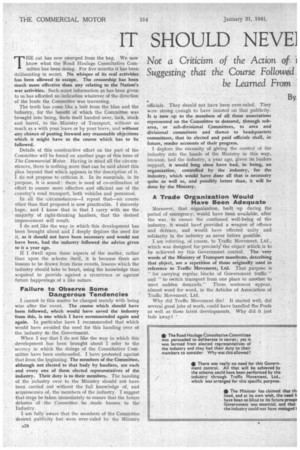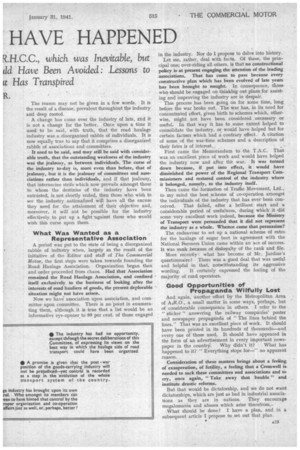IT SHOULD NEVE] HAVE HAPPENED
Page 26

Page 27

If you've noticed an error in this article please click here to report it so we can fix it.
THE at has now emerged from the bag. We now know. what the Road Haulage Consultative Committee has been doing. For five months it has been deliberating in secret. No whisper of its real activities has been allowed to escape. The censorship has been much more effective than any relating to the Nation's war activities. Such scant information as has been given to us has afforded no indication whatever of the direction of the 1-oute the Committee was traversing.
The truth has come like a bolt from the blue and the industry, for the benefit of which the Committee was brought into being, finds itself handed over, lock, stock and barrel, to the ,Ministry of Transport, without so much as a with your leave or by your leave, and without siny .chance of putting forward any reasonable objections which it might have to the course which has to be followed.
Details of this constructive effort on the part of the Committee will be found on another page of this issue of The Commercial Motor. Having in mind all the circumstances, there is nothing more that can be said about this plan beyond that which appears in the description of it. I do not propose to criticize it. In its essentials, in its
, purpose, it is sound: there is need of co-ordination of effort to ensure more effective and efficient use of the country's road transport, both vehicles and personnel.
In all the circumstances—I repeat that—no course other than that proposed is now practicable. I sincerely hope, and I know that in that I carry with me the majority of right-thinking hauliers, that the desired improvement will result.
I do not like the way in which this development has been brought about and I deeply deplore the need for it, as it should not have been necessary and woukl not have been, had the industry followedthe advice given to it a year ago.
• If I dwell upon these aspects of the matter, rather than upon the scheme itself, it is because there are lessons to be draivn from these events, lessons which the industry should take to heart, using the knowledge thus acquired to provide against a recurrence or against future happenings of a like nature.
Failure to Observe Some . Dangerous Tendencies
I cannot in this matter be charged merely with being wise after the event. The course which should have been followed, which would have saved the industry from this, is one which I have recommended again and again. In particular have I recommended that which would have avoided the need for this handing over of the industry to the Government.
When I Say that I do not like the way in which this development has been brought about I refer to the secrecy in which the doings of the Consultative Conimittee have been enshrouded. I have protested against that from the beginning. The members of the Committee, although not elected to that body by hauliers, are each and every one of them elected representatives of the industry. Their duty is to their members. The handing of the industry over to the Ministry should not have been carried out without the full knowledge of, and acquiescenee of, the members of the industry. I suggest that steps be taken immediately to ensure that the future debates of the Committee be made known to the . Industry. . .
I am fully aware that the members of the Committee desired publicity but were over-ruled by the Ministry officials. They should not have been over-ruled. They were strong cnough to have insisted on that publicity. It is now up to the members of all those associations represented on the Comulittee to demand, through subarea, or sub-divisional Cotnmittees, to area and divisional committees and thence to headquarters committees, that its elected and paid officials shall, in future, render accounts of their progress.
I deplore the necessity of giving the control of the industry into the hands of the Ministry in this way, because, had the industry, a year ago, given its leaders support, it would long since have had, in being, an organization, controlled by the industry, for the industry, which woukl have done all that is necessary quite as well as, and possibly better than, it will be done by the Ministry.
A Trade Organization Would . Have Been Adequate
Moreover, that organization, built up during the period of emergency, would have been available, after the war, to ensure the continued well-being of the industry, it would have provided a weapon of offence and defence, and would have effected unity and solidarity in the industry, as never before possible.
I am referring, of course, to Traffic Movement, Ltd., which was designed for precisely' the object which is to be achieved by this Government control. The very words of the Ministry of Transport manifesto, describing that object, are a repetition of those originally used in reference to Traffic Movement, Ltd. That purpose is " for carrying regular, blocks of Government traffic" and " to switch transport from one place to another to meet sudden demands." Those sentences appear, almost word for word, in the Articles of Association of Traffic Movement, Ltd.
Why, did Traffic Movement die? It started well, did several good jobs of work, could have handled the Pools as well as these latest developments. Why did it just fade away? ' The reason may not be given in a few words. It is the result of a disease, prevalent throughout the industry and deep rooted.
A change has come over the industry of late, and it is not a change for the better. Once upon a time it used to be said, with truth, that the road haulage industry was a disorganized rabble of individuals. It is now equally true to say. that it comprises a disorganized rabble of associations and committees.
It used to be said, and may still be said with considerable truth, that the outstanding weakness of the industry was the jealousy, as between individuals. The curse of the industry to-day is, more even than before, that of jealousy, but it is the jealousy of committees and associations rather than individuals, and if that jealousy, that internecine strife which now prevails amongst those to whom the destinies of the industry have been entrusted, is not shortly ended, then those who wish to see the industry nationalized will have all the excuse they need for the attainment of their objective and, moreover, it will not be possible for the industry effectively to put up a fight -against those who would wish this curse upon them.
What Was Wanted as a Representative Association A period was put to the state of being a disorganized rabble of indtstry when, largely as the result of the initiative of the Editor and staff of The Commercial Motor, the first steps were taken .towards founding the Road Haulage Association. Organization began then and order proceeded from chaos. Had that Association remained the Road Haulage Association, and confined itself exclusively to the business of looking after the interests of road hauliers of goads, the present deplorable situation might not have arisen.
Now we have association upon assbciation, and committee upon committee. There is no 'point in enumerating them, although it is true that a list would be an informative eye-opener. to 99 per cent. of those engaged
in the industry. Nor do I propose to delve into history.
Let me, rather, deal with facts. Of these, the principal one; over-riding all others, is that no constructional policy is at present engaging the attention of the leading associations. That has come to pass because every constructive plan which has been evolved of late years has been brought to nought In consequence, those who should be engaged on thinking out plans for assisting and improving the industry are in despair.
This process has been going on for some time, long before the war broke out. The war has, in its need for concentrated effort, given birth to schemes which, otherwise, might not have been considered necessary or useful. In that way it has to some extent helped to consolidate the industry, or would have helped but for certain factors which had a contrary effect. A citation of some of the war-time schemes and a description of their fates is of interest., • First came the Memorandum to the T.A.C. That was an excellent piece of work and would have helped the industry now and after the war. It was turned down because, if put into effect, it would have diminished the power of the Regional Transport Commissioners and restored control of the industry where it belonged, namely, to the industry itself.
Then came the formation of Traffic Movement, Ltd., to my mind the best scheme of co-operation amongst the individuals of the industry that has ever been con
ceived. That failed, after a brilliant start and a considerable period of usefulness, during whichit did some very excellent work indeed, because the Ministry of Transport were persuaded that it Aid not represent the industry as a whole. Whence came that persuasion?
The endeavour to set up a national scheme of rates for the haulage of sugar beet in agreement with the National Farmers Union came within an ace of success. It was sunk because of disloyalty of the rank and file.
More recently : what has become of Mr. Jardine's questionnaire? There was a good deal that was useful and helpful in that, notwithstanding its aggressive wording. It certainly expressed the feeling of the ' majority of road operators.
Good Opportunities of .Propaganda Wilfully Lost And again, another effort by the Metropolitan Area of A411.0., a small matter in some ways, perhaps, but of considerable consequence in others. I refer to the " sticker " answering the railway companies' poster and newspaper propaganda ol "The lines behind the lines." That was an excellent piece of work. It should have been printed in its hundreds of thousands—and every one of those used,. It should have appeared in the form qf an advertisement in every important news paper in the country. Why didn't it? What has happened to it? "Everything stops for—" no apparent reason.
Consideration of these matters brings about a feeling of exasperation, of futility, a feeling that a Cromwell is needed to sack these committees and associations and to cry, once again, "Take away that bauble" and institute drastic reforms.
But that would be dictatorship, and we do not want dictatorships, which are just as bad in industrial associations as they are in nations. They encourage megalomania and abuses which arise therefrom., What should be done? I have a plan, and in a subsequent article I propose to set out that plan.




















































